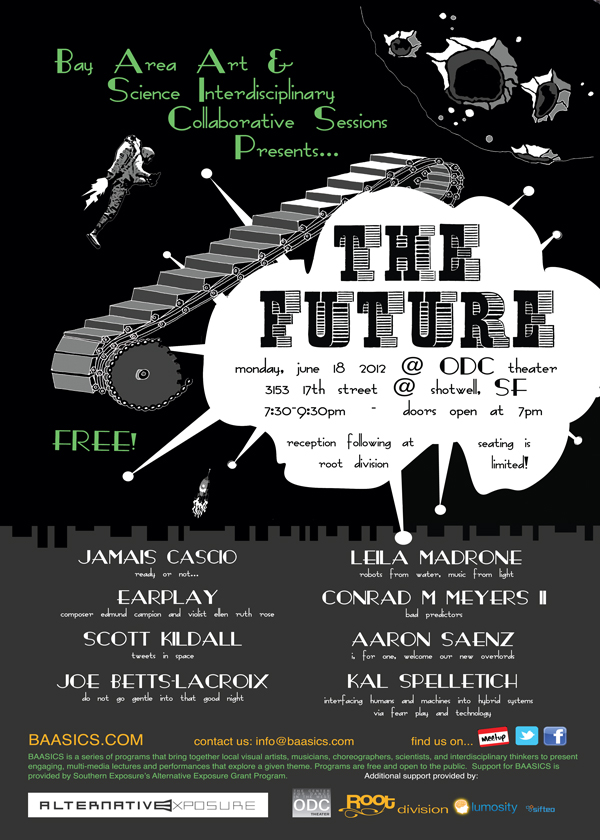 One of my favorite posts from my time here at Open the Future has to be Legacy Futures, from late 2008. The concept of a legacy future is simple: it's a persistent but outdated vision of the future that distorts present-day futures thinking. As I suggest in the original piece, the "jet pack" is the canonical legacy future -- just about every futurist you'll ever meet could tell you about being asked when we'll get our personal jet packs. Nine times out of ten, the person doing the asking thinks that they're being clever.
One of my favorite posts from my time here at Open the Future has to be Legacy Futures, from late 2008. The concept of a legacy future is simple: it's a persistent but outdated vision of the future that distorts present-day futures thinking. As I suggest in the original piece, the "jet pack" is the canonical legacy future -- just about every futurist you'll ever meet could tell you about being asked when we'll get our personal jet packs. Nine times out of ten, the person doing the asking thinks that they're being clever.
Some of the other legacy futures I brought up in the 2008 essay include Second Life, hydrogen fuel cell vehicles, and population projections that don't account for technological (especially healthcare) changes. I'm less-inclined to include the third one at this point, though -- one important characteristic of a legacy future is that it can conjure up a vision of tomorrow with a simple, usually two-word, phrase. "Jet packs!" "Second Life!" "Fuel cells!" Maybe the future population vision of "overpopulation crisis!" would count.
It's important to remember that the problem with legacy futures isn't that they're actually impossible, but that they're wrong in a fundamental way. The reason we don't have jet packs instead of cars today isn't because jet packs don't exist, nor because of a grand conspiracy -- it's because there are basic, practical problems with jet packs that would be too difficult to solve today.
But of increasing interest to me is the question of what present-day "plausible" visions of the future will be the legacy futures of the next generation. What are the scenarios and assumptions about the world of tomorrow that seem almost inevitable -- or at least common-sense -- today, but will in a few years (or a few decades) be seen as hopelessly off-base, but still shaping how people view The Future?
One obvious candidate is a perspective I found myself immersed in during my trip to Astana: the idea that fossil fuels will remain the primary source of energy for at least the next 40 years. The notion that coal, oil, and natural gas will still be the dominant energy sources in 2050 is utterly conventional wisdom in the energy industry -- unsurprising, perhaps, but it's a perspective that shapes how many political and economic figures think about energy. The only challenge to that view that is considered acceptable is the notion of "peak oil," and then only to dismiss it. The idea that climate disruption would cause a radical shift in energy consumption patterns gets laughed off with comments along the lines of "it would take too long/be too expensive/be simply impossible to replace fossil energy with 'alternative' energy." But you don't have to be a hardcore green to see that the trajectory of energy and industrial technologies is moving quite decisively away from reliance on fossil fuels; even the current spike in natural gas has some big underlying problems (not the least of which is the fact that fracking can and does trigger earthquakes).
Those who are familiar with my work will find this particular argument unsurprising at best. However, I suspect that an equally problematic vision of the future can be found in the scenarios that posit a total civilization collapse due to global warming. While the "global apocalypse" future is pretty commonplace, I'm not sure the global warming variant counts as a potential legacy future -- it's not a concept that's widely-embraced by the public at large, at least not yet. Zombie Apocalypse futures are more popular (but are not true legacy futures, as the idea of a Zombie Apocalypse doesn't really change our behavior).
This doesn't mean that I don't think that global warming will be a problem. But it seems likely to me that the 2012 vision of what a global climate disaster looks like wouldn't really match the reality. It seems more likely, for example, that we'd see parts of the world able to adapt more readily than others -- so an overwhelming catastrophe in (say) India is only a series of manageable disasters in (say) the US. Or a series of rapid-fire improvements and setbacks, unstable but never quite tipping into collapse. Or maybe, just maybe, a catalyst for profound beneficial change.
Reality is always more complex than popular visions of the future would have us think.
But, as I said, what I want to figure out are the legacy futures yet to come. Some candidates:
The Singularity
End of Scarcity
Functional Immortality
Everyone on Facebook
Robot wars
All of these are presumably possible in some way, but strike me as very likely to come about in ways that differ considerably from present-day visions.
The first three of these tend to be more popular with the Wired/io9/futurist crowd than with the popular culture in the West. The Facebook is everywhere future and the Robot/drone warfare future are more widespread. I can't off the top of my head think of other commonplace in pop culture proto-legacy futures -- the majority of future visions that you find in the mass culture tend to already be legacy concepts.
I don't have a grand conclusion at this point, but wanted to toss this out there for the massmind to consider. I'll very likely come back to this topic again soon.

 One of my favorite posts from my time here at Open the Future has to be
One of my favorite posts from my time here at Open the Future has to be 


